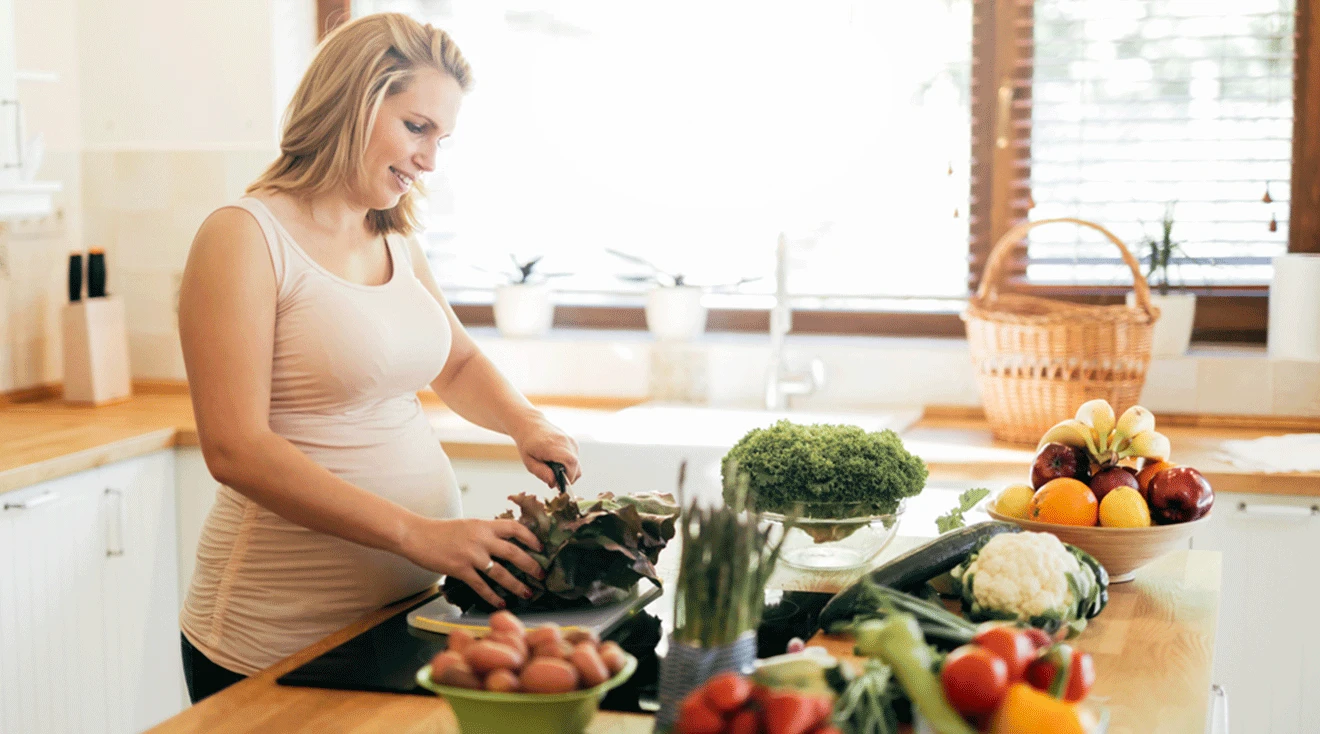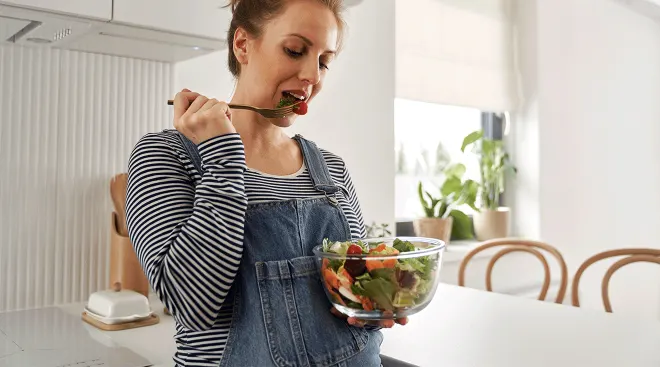10 Superfoods to Eat During Pregnancy
There’s nothing like finding out you’re pregnant to encourage better eating habits. After all, your body is going through big changes, and both you and baby need a full dose of vitamins and nutrients to stay well and strong. But what counts as healthy food for pregnancy? Don’t worry—we’ve got you covered. Here are 10 of the best foods to eat when pregnant, and why.
What it’s got: Whether you like them fried, scrambled, hard-boiled or served as an omelet, eggs are the gold standard for prenatal protein. They also happen to be a great source of folate, iron and choline.
Why it’s good for both of you: Not only are eggs a relatively cheap, versatile and convenient source of protein, but they contain choline too. Never heard of that last one? Choline is critical to fetal brain development and reduces the risk of neural tube defects, such as spina bifida. But to reap the benefits, you’ll have to eat the whole thing, since choline is contained in the yolk (so forget the egg-whites-only order). Bonus: Give baby a brain boost by buying eggs fortified with omega-3s.
What it’s got: Don’t just save these guys for Thanksgiving—sweet potatoes are full of nutritious fiber, vitamin B6, potassium (even more than bananas have!), vitamin C and iron, as well as copper and beta-carotene.
Why it’s good for both of you: Sure, other foods on our list offer many of the same nutrients, but we’re singling out sweet potatoes for their beta-carotene, an antioxidant that your body converts to vitamin A. And as you may recall, vitamin A plays an important role in the development of baby’s eyes, bones and skin. These orange spuds are also a great way to meet your iron quota, and also contain copper, a mineral that helps your body absorb iron. So swap in sweet potatoes for your usual sides; they’re great mashed, baked or French-fried (um, yum!).
What they’ve got: This crunchy (and convenient) snack is full of healthy fats (including those brain-boosting omega-3s we mentioned earlier), protein, fiber and a variety of vitamins and minerals. Plus, noshing on nuts will help make a dent in the 350 milligrams of magnesium you’re supposed to get now that you’re pregnant.
Why they’re good for both of you: Munching on magnesium-rich foods helps reduce the risk of premature labor and aids in the development of baby’s nervous system. A cup of sliced almonds contains nearly 250 mg of magnesium, so keep a stash in your purse for a convenient prenatal power snack. Cravings control: If you feel like a bottomless pit these days, try noshing on pistachios with shells. They have slightly less magnesium (150 mg per cup), but they take longer to eat, giving your body more time to register that it’s full.
What they’ve got: If you’re not a big meat eater (or one at all), beans and lentils are great sources of protein and iron, as well as folate, fiber and calcium. And beans (especially baked ones) are also bursting with zinc.
Why they’re good for both of you: Beans boast a bunch of the baby- and mom-friendly minerals found in animal products, so they’re a great option for vegetarian and vegan moms-to-be. Beans are also rich in zinc, an essential mineral that’s linked to a lower risk for preterm delivery, low birth weight and prolonged labor. Beans bother your stomach? Other great sources of zinc include meat, chicken, milk, fortified cereals, cashews, peas, crab and oysters (just don’t eat them raw!).
What it’s got: Sure, you know it’s a great source of protein, but lean beef and pork are also packed with iron and B vitamins.
Why it’s good for both of you: Your body needs a lot more protein now (about 25 extra grams a day) to help baby grow and to ensure that her muscles develop properly. Same goes for iron: Not getting enough of this mineral can impair baby’s growth and increase the risk for preterm delivery and low birth weight. Iron is important for mom, too—it’s necessary for red blood cell formation (to prevent anemia). During pregnancy, your blood volume increases, so you’ll need to up your iron intake (to around 27 milligrams a day). Bonus: Meat supplies a hefty dose of vitamins B6, which helps baby’s tissue and brain growth while easing mom’s morning sickness, and B12, which helps maintain healthy nerves and red blood cells.
What it’s got: Down a glass of OJ in the morning to fill up on folate, potassium and, of course, vitamin C.
Why it’s good for both of you: You’ve probably heard a lot of buzz about folate and folic acid (the synthetic form that you get in supplements and fortified foods), and with good reason: It’s a necessary nutrient for preventing certain birth defects early on in pregnancy, and for ensuring a healthy pregnancy after that, so try to get the recommended 400 micrograms a day. The potassium in OJ is important for keeping your muscle function, metabolism and overall health in working condition. Like iron, pregnant women need to consume more potassium because of their expanding blood volume. And as you already know, orange juice is an excellent source of vitamin C, which, in addition to fighting colds, helps your body better absorb iron and keeps both your and baby’s teeth and bones healthy.
You can also get your vitamin C from broccoli, tomatoes, strawberries, red peppers and a variety of citrus fruits, including another prenatal power food: mangoes, which are packed with more than 20 different vitamins and minerals. Bonus: Opt for OJ that’s fortified with vitamin D, which increases blood circulation in the placenta and aids in calcium absorption so baby will have stronger bones.
What it’s got: Surprise! Plain yogurt actually contains slightly more calcium than milk. Plus, it’s got essential bone-building nutrients, including protein, B vitamins and zinc.
Why it’s good for both of you: Calcium is essential for keeping your bones and teeth healthy and helping baby to develop his, and skimping on this key nutrient could put you both at risk. Expectant moms should get 1,000 mg of calcium a day to reduce the risk of low birth weight and preterm delivery. If your calcium count comes up short, your body will take the calcium baby needs from your bones, putting you at greater risk for osteoporosis later on. Bonus: Snack on Greek yogurt topped with fruit for double the protein (and fiber) punch.
What it’s got: Those oats are filled with fiber, protein and vitamin B6.
Why it’s good for both of you: Start your morning off right with a nice big bowl of oatmeal. Whole grains are great for keeping your energy levels up, especially if morning sickness has you feeling a bit drained. Plus, all that fiber will help with another pregnancy-related issue: constipation. But the benefits don’t just stop with mom. This convenient breakfast dish (yep, the instant kind is great too!) also contains protein and vitamin B6, both of which are important for baby’s development. Bonus: Look for a variety that’s fortified with iron, B vitamins and folic acid.
What it’s got: You had to know these guys were gonna make the list. Chock-full of antioxidants and nutrients, dark-green veggies—including spinach, asparagus, broccoli and kale—should be on everyone’s pregnancy grocery list.
Why it’s good for both of you: These superfoods are especially important for moms-to-be and developing babies. That’s because, in addition to all those antioxidants, leafy greens supply calcium, potassium, fiber, folate and vitamin A. Not exactly craving asparagus or spinach? Oranges are also a great source of vitamin A.
What it’s got: This oily fish is an excellent source of omega-3 fatty acids and protein.
Why it’s good for both of you: Forget about preordering Baby Einstein DVDs to give baby a brain-boost—just incorporate salmon into your diet over the next nine months. The omega-3 fatty acids (aka DHA and EPA) in fish help baby’s brain to develop, and higher levels of DHA in newborns have even been associated with higher IQs, advanced motor skills and fewer neurological problems later on. Omega-3s are good for the development of baby’s eyes too, and salmon is also a great source of lean protein for moms-to-be. Worried about seafood? Salmon is low in mercury and considered safe for expectant moms, but limit your intake to two to three servings of four ounces or less each week to be safe. Just not feeling fish right now? Snack on walnuts and almonds.
Please note: The Bump and the materials and information it contains are not intended to, and do not constitute, medical or other health advice or diagnosis and should not be used as such. You should always consult with a qualified physician or health professional about your specific circumstances.
Elizabeth Ward, RD, is registered dietitian and recipe developer. She is the also the author of Expect The Best, Your Guide to Healthy Eating Before, During & After Pregnancy. She earned her master's degree from Boston University.
Maria Pari-Keener, RD, is a clinical dietitian with NewYork-Presbyterian Brooklyn Methodist Hospital. She earned her master's degree in nutrition from Brooklyn College.
Learn how we ensure the accuracy of our content through our editorial and medical review process.
Navigate forward to interact with the calendar and select a date. Press the question mark key to get the keyboard shortcuts for changing dates.




















































